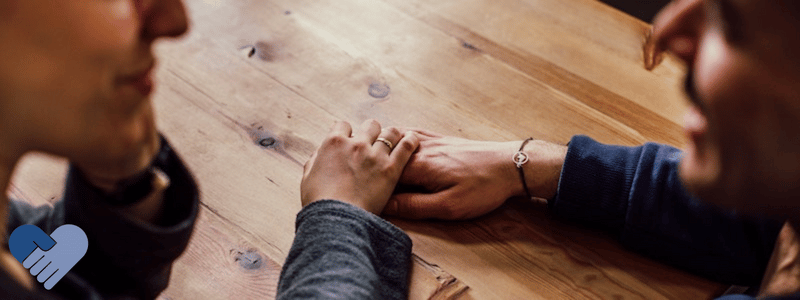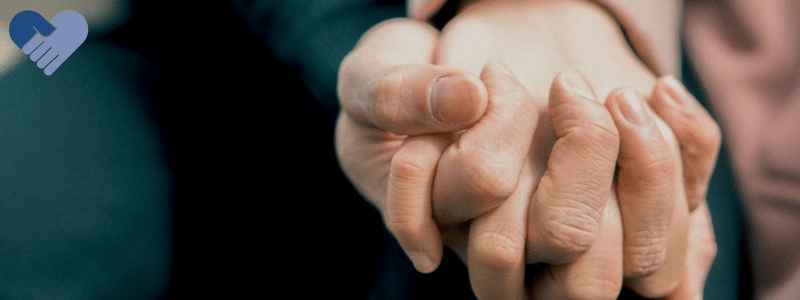How To Let Go Of An Addict You Love
We'll comprehend the following:
- Who qualifies as a drug addict?
- What to say to someone addicted to drugs
- Dealing with loved ones addicted to drugs
- When is information technology fourth dimension to allow go of a drug aficionado in your life?
- How to help someone addicted to drugs
It's not uncommon for people to ask, how do I permit go of someone or something negatively affecting me?
Rather than seeing information technology as letting go, it'due south more digestible to see it as how to disassemble yourself from a person, place, or thing causing y'all grief.
We will continue to use the term "permit become" every bit that's what comes to mind for most people when considering detaching from someone. Please remember that we aren't letting go, just rather, we're detaching with love. We say this considering letting become sounds harsh for some and feels like forever for others.
When we exercise interventions for drug addicts and their families, we never suggest kick your loved 1 to the curb or "throwing them out." Doing and so means leaving a drug aficionado loftier and dry with nothing. That seems to be what people hear, not what is being said.
We suggest that you have their determination not to get assistance or keep the status quo of drug use and subversive behavior. We likewise recommend that yous inquire in render for them to take your decision to no longer stay front and center to their addiction and behaviors affecting y'all and helping them stay unwell.
"What yous should be asking is, "how practice I let go of my enabling and codependency to the drug addict then that they are able to encounter the demand for help?"
Letting go of a drug addict starts with learning to allow go of family unit behaviors that comfort or enable the addict. When an aficionado or an alcoholic is enabled, it disables the chances of seeing the need to enquire for assist.
When a family unit isn't enabling, and the addict can notwithstanding navigate the addiction in and of themselves on their own resource, yous can still let get and disassemble yourself from their choices and destructive behaviors.
Regardless of leverage or whether or not anyone or anything is supporting the drug addict, the family can accept care of themselves if they are existence affected past the drug abuse. If you intermission downward the question of how to let go of a drug addict, the question should be directed toward the affected people, not the drug addict. The person asking should be looking at what they can practise for themselves and not what they tin do for the drug addict direct.
Nosotros hope those request the question aren't looking for an answer as to how to manage the habit better and are searching for ways to accept the addiction and move on with their life by letting become and detaching from information technology.
Letting go of a drug addict requires letting go of your attachment to the drug aficionado and their behaviors. The attachment requires detachment and self-healing.

Family Get-go Intervention applies most of its resources and efforts before, during, and subsequently the intervention to help families understand this. The family may non ever be able to make their loved one stop using drugs direct. Most family members, however, tin set boundaries, detach, employ tough love, concord the drug addict accountable, and permit them to feel their own consequences.
These principles, along with the family's recovery, tin can help start the process of detaching and letting go of the loved one's addiction.
Who Qualifies as a Drug Addict?
Determining the severity of substance use disorders, the clinically recommended levels of intendance, and advisable handling options requires a professional cess.
In answering how to permit go of a drug addict, the cess most likely doesn't change why you felt the need to enquiry this question.
The question isn't, "Who qualifies equally a drug addict?" simply rather, "Who should I allow go of and detach from when drug use and harmful behaviors are affecting my family?" Whether the drug aficionado qualifies on a paper cess or non, it doesn't change how you are affected or how you feel most the situation.
In the eyes of the affected family and friends, when should someone affected by the addict detach and allow go of the person using drugs?
Suppose someone close to yous is abusing drugs or alcohol, and others are getting pulled into the chaos ensuing from habit. In that case, that may be all that's required for yous to qualify them equally an addict and the time to consider letting get and making changes for yourself. It's not about what anyone else thinks, including professionals; it should be based on how you feel most information technology and what it's doing to you.
"The question is not who qualifies equally a drug aficionado." The question is who qualifies to be allow go of and detached from regardless of what an assessment says".
The point we're trying to make is that it doesn't matter how much someone uses, information technology doesn't matter how oft they use, information technology doesn't matter what they use, and it doesn't affair where they apply – it merely matters what they do to themselves and others as a upshot of the drug use.
Of grade, those things matter for handling level of care and potential medical complications. But it's time to do something when you have had enough of the addict's behaviors affecting you lot and your family.
"Assessments focus most entirely on the substance user with very lilliputian emphasis, if whatsoever, on the harm it is causing their family and friends."
Assessments focus on the amounts used, the frequency of use, the drug of choice, the severity of the habit, and recommended level of care. Some focus on medical issues, legal problems, relapse potential, and living arrangements. I tin can't think of one that emphasizes what the drug addict or alcoholic has done to their family, friends, and society past way of emotional distress.
Imagine if assessments were done on a substance user and included input from their friends and family. Something tells me it would be far more authentic than the minimized assessment often served by the substance user.
Nosotros aren't insinuating the substance user is a liar. We're implying that substance users often minimize and tell a distorted story due to their skewed perception at the cess time; This is why family recovery is then of import and why we strongly suggest it. For the friends and family of a substance user to let go and detach themselves, they first take to notice the instruction and strength to assist them understand why and when to do that.
"Stop focusing on the drug of choice, the amounts used, and the frequency, and start focusing on their behaviors that are affecting you."
What to Say to Someone Addicted to Drugs
What's more than constructive than what yous say to an addict is how you say information technology and whether or not y'all follow through with it. There are various stages a drug aficionado can be in, and their stage determines how to communicate with them effectively.
When in that location's denial, the aficionado could be either in the pre-contemplation or contemplation stage. A telltale sign of which phase of addiction they are in is the reaction you receive when against them near it.

A person is rarely in the pre-contemplation phase. In this stage, the substance user is entirely unaware of a problem.
When a person is in the pre-contemplation stage, they are less likely to get angry when confronted. It'south not to say they won't get angry; they are more likely to answer in an aloof or puzzled manner because they genuinely don't believe they accept a problem or feel that they are harming themselves or others.
If your loved one is in this phase, it'south best to consult a professional person interventionist on how to beginning the conversation and create ambivalence.
Should your loved one be in the contemplation phase, your strategies are slightly different.
When trying to speak to someone in the contemplation stage, yous are much more than likely to exist met with resistance and acrimony, most probable coming from the fear of existence challenged.
Since you already have ambivalence in the contemplation stage, the goal is to invoke change talk and help overcome sustained talk while managing the confrontation. You are trying to help the drug addict see a greater need to do something virtually the problem than do little to nothing nearly information technology.
Moving a drug addict out of this stage and onto training, followed by action, requires a professional to use evidenced-based intervention strategies such as motivational interviewing. When used effectively by a trained professional person, this fine art of communication can help the substance user see a greater need for change.
Furthermore, a trained professional interventionist can help the drug addict or alcoholic feel that they are taking the next step because they want to and not because they feel the family unit is making them do information technology.
One of the about constructive ways to move a substance user out of the contemplation stage comes with the family changing themselves and the environment. In this crucial stage, the drug addict or alcoholic has to encounter a greater need to seek help than not.
Even the best professionals in the world with strong backgrounds in motivational interviewing are rarely enough to move an addict through the stages of change if the surround remains the same. In other words, along with the intervention professional person utilizing evidence-based intervention strategies such as motivational interviewing, changes in the environment to ostend the need for change are also required.
Even if motivational interviewing were enough to assist the drug addict in seeking assistance, a lack of family recovery would most probable exit the loved one susceptible to relapse after completing treatment.
The surround is i of the number one predictors of outcomes in addiction treatment. When the environment doesn't change, the substance user rarely sustains sobriety, if they even find sobriety.
Examples of changes in environment include the family changing grade on their enabling, codependency, communication, boundaries, and accountability for the drug addict.
We're saying that talk is cheap, simply activeness is not.
Moving your loved i into recovery will require a professional evoking modify in them. Simultaneously, the family changes the environment to help them see a greater need to have help.
"It is non about waiting for the substance user to desire assistance or hit bottom. It is about changing the environment that prevents the substance user from doing either".
Dealing With Loved Ones Addicted to Drugs
Dealing with someone addicted to drugs is giving attention to the substance user, which involves the afflicted parties making a decision that would bear upon the substance user and their family.
The goal of dealing with your loved i is to change the environment in which their addiction thrives. In improver to changing the environment, the family tin bargain with the addiction past changing their position and addressing their family unit roles, codependency, enabling, boundaries, and accountability for the aficionado.
How you deal with your loved one depends on what you want for yourselves and them. If you lot feel yous need to stay in the insanity of the habit, and then how you deal with the drug addict will await much unlike than if y'all choose to detach and allow go.
And aye, some families practise choose the first choice. They cannot let go of the role that allows them to feel needed in the relationship. It gives them a sense of purpose in their life as the caretaker of the drug addict.

Remember, people enable for selfish reasons, not to help the drug addict. Most enablers know information technology hurts the addict, so why do they notwithstanding practice it?
They do it because it fills a void and feels good for the one enabling. It avoids confrontation, and it allows the enabler to remain a victim. These are just some behaviors of a dysfunctional family unit arrangement that evolves due to a loved ane'southward addiction.
Dealing with a loved one addicted to drugs means dealing with your habit to your loved one. Whether it be overwhelming codependency and enabling or just reactivity and stress from afar, if you permit the drug addict own your thoughts and emotions, they are controlling you. The question isn't "How do I deal or negotiate with my loved one fond to drugs?" it's, "How exercise I detach from their addiction and accept my life back?"
Many families who call united states don't necessarily want everything to do a complete one-lxxx and accept the addict recover. Indeed, many families don't arbitrate because they are selfishly more concerned nigh what will happen to themselves than they are concerned with what volition happen if the drug addict gets better.
Many families are looking for how to ameliorate manage and command their loved ones and their addiction without fully letting go of their acquired dysfunctional family roles.
The tagline on the front folio of our website states that an intervention isn't about how to control the substance user; it's about how to allow go of believing y'all can. So the question should be, "How do I let go of believing I tin control them, and how do I detach and avoid the insanity the drug aficionado pulls me into?"
"The question is not how do bargain or negotiate with a loved one addicted to drugs. The question is, "how do I detach from their addiction and take my life dorsum?"
When is it Time to Let Go of a Drug Addict in Your Life?
The time to detach and allow go of a drug addict is when you take striking rock bottom and want help. So much emphasis is put on waiting for the drug aficionado to do something commencement. Why is that? Why are nosotros not telling those affected by drug addiction that you don't have to await for them to desire help or hit bottom and that you lot can make the get-go move?
The reply is most likely considering people are and so used to the drug aficionado running the evidence into the ground that information technology only makes sense to feel they are the ones who should run the show on to when to terminate. Information technology's your choice to sit down back and wait for them, and it'due south also your choice to take the beginning step.
The time to allow go is when you realize that you are contributing nil to your well-existence, and by being fastened to the habit, you are nigh likely contributing to the addiction.
It's okay to say no.
It's okay to disassemble yourself from an unhealthy relationship.
The merely people we see who stay fastened to addiction are those who become something in render for information technology. Enquire yourself, "Why am I staying attached to the drug addict in my life?"
Nosotros know letting go is easier said than done. And we sympathize one time y'all get through the pain of letting go, your life volition improve.
You may never exist entirely okay when your loved i is addicted to drugs, and yous'll be better than you were by detaching and starting your recovery for family members and loved ones of drug addicts.
If you are asking when information technology's fourth dimension to permit become of the drug addict in your life, so at present is probably the fourth dimension.
"The but people we see who stay attached to an addiction are those who get something in return from staying fastened to the habit."
Another way to answer the question of when it is time to allow go of a drug aficionado is to reference our assessment of codependency and our information on how to detach and still love them without enabling them.
How to Help Someone Addicted to Drugs
The quick reply is to stop helping them use drugs. When a question or business arises, ask yourself, "is what I am nearly to say or practise for the substance user going to make their addiction more difficult or more comfortable for them?" If you bring this question dorsum to the clinical data and the science, you lot take the answer.
Nosotros know that for someone addicted to drugs to movement through the stages of modify, they need to come across the need for alter. About drug addicts don't see that need for change in their distorted perception of reality.
There must exist a change in the environment, the family, and the status quo to run across the need to practise something different. The drug addict doesn't wake up one solar day when everything is going well and check into substance abuse handling. If there are no consequences or uncomfortable moments in the addiction, the addiction remains the best choice for the drug addict.
How to help someone fond to drugs is to let go of them and detach from them. To assist them is to concord them accountable, protect yourself from them with boundaries, and step out of the way so they tin can feel the consequences.
Someday a person, place, or matter stands in the style of consequences, they shield the drug aficionado from seeing the need for change. The strategy is to allow them to feel the consequences while not believing the family is causing them.

When a drug addict is a perceived victim and is under the illusion that everything bad that happens is considering of some other person, place, or affair, then the addict still finds it hard to practice something about their problem.
When this happens, they will spend more than time in resentment seeking revenge than owing the problem and doing something about information technology. This is why practice-it-yourself interventions without a professional rarely work.
0In the rare event the DIY intervention ends with the aficionado accepting help and entering treatment, they usually leave handling early or relapse shortly afterward. This is because the drug addict is nonetheless virtually probable blaming anybody else for having to go to handling. At the aforementioned time, the family unit does nothing different to alter their behaviors or the surroundings.
"When a drug addict is a perceived victim and is under the illusion that everything bad that happens is because of some other person, place, or thing, so the addict still finds it difficult to exercise something about their problem."
Choose Family unit Offset Intervention for Addiction Recovery
To help a drug aficionado is to aid yourself first. At Family First Intervention, we help you understand that if the family wants their loved one to change, they almost ever have to have the showtime step.
If the addict takes the commencement step, the family unit would be wise to take the second step correct backside them. Addiction becomes a family unit illness, and only focusing on improving the substance user has caused many drug addicts to fail. Equally a result, many families lose hope that things volition improve.
Let'due south stop blaming the treatment centers and the systems for the drug addicts' failures, and let's all start taking accountability for our roles in addiction.
"What the family is expecting the substance user to do is what they also have to exercise. If only i side seeks help, the chances of success are greatly compromised."
Source: https://family-intervention.com/blog/how-to-let-go-of-a-drug-addict/

0 Response to "How To Let Go Of An Addict You Love"
Post a Comment